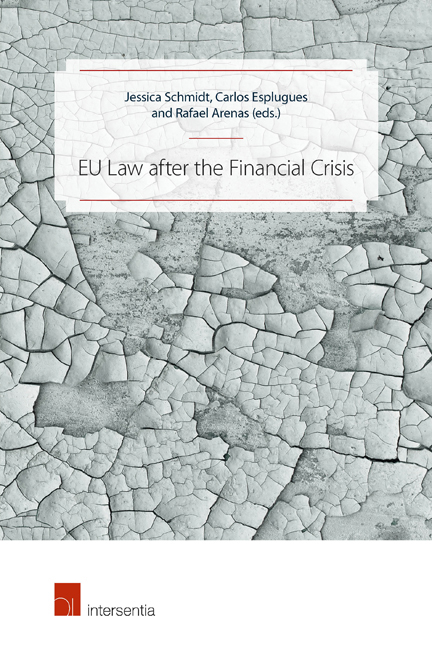Book contents
- Frontmatter
- Contents
- List of Abbreviations
- List of Authors
- Introduction
- PART I RESCUE MECHANISMS AND MONETARY POLICY
- PART II THE IMPACT OF THE FINANCIAL CRISIS ON THE BANKING SECTOR AND CAPITAL MARKETS
- PART III THE FINANCIAL CRISIS AND TAX LAW
- PART IV THE FINANCIAL CRISIS, CONSUMERS AND CONSUMER LAW
- PART V THE FINANCIAL CRISIS AND COMPETITION LAW
- PART VI THE FINANCIAL CRISIS, RESTRUCTURING AND INSOLVENCY LAW
- PART VII THE SOCIAL DIMENSION OF THE FINANCIAL CRISIS AND EU CITIZENSHIP
- Reflections on the Social and Human Dimension of the Economic and Financial Crisis in the European Union
- New Developments on the Free Movement of Persons in the European Union in a Time of Crisis. Eroding the European Citizenship?
- PART VIII REFLECTIONS ON THE IMPACT OF THE FINANCIAL CRISIS ON THE GENERAL EUROPEAN LEGAL FRAMEWORK AND THE FUNDAMENTAL “EUROPEAN IDEA”
New Developments on the Free Movement of Persons in the European Union in a Time of Crisis. Eroding the European Citizenship?
from PART VII - THE SOCIAL DIMENSION OF THE FINANCIAL CRISIS AND EU CITIZENSHIP
Published online by Cambridge University Press: 13 December 2017
- Frontmatter
- Contents
- List of Abbreviations
- List of Authors
- Introduction
- PART I RESCUE MECHANISMS AND MONETARY POLICY
- PART II THE IMPACT OF THE FINANCIAL CRISIS ON THE BANKING SECTOR AND CAPITAL MARKETS
- PART III THE FINANCIAL CRISIS AND TAX LAW
- PART IV THE FINANCIAL CRISIS, CONSUMERS AND CONSUMER LAW
- PART V THE FINANCIAL CRISIS AND COMPETITION LAW
- PART VI THE FINANCIAL CRISIS, RESTRUCTURING AND INSOLVENCY LAW
- PART VII THE SOCIAL DIMENSION OF THE FINANCIAL CRISIS AND EU CITIZENSHIP
- Reflections on the Social and Human Dimension of the Economic and Financial Crisis in the European Union
- New Developments on the Free Movement of Persons in the European Union in a Time of Crisis. Eroding the European Citizenship?
- PART VIII REFLECTIONS ON THE IMPACT OF THE FINANCIAL CRISIS ON THE GENERAL EUROPEAN LEGAL FRAMEWORK AND THE FUNDAMENTAL “EUROPEAN IDEA”
Summary
INTRODUCTORY REMARKS
The purpose of this chapter is to rethink some of the new restrictive developments that affect the free movement of persons in the European Union within the context of the current economic crisis, in order to discern to what extent they could be eroding European citizenship.
With the purpose to achieve this goal, the present work focuses on three main questions. Obviously, they are not the only problems that the clash between the economic crisis and the freedom of movement of persons has brought about, but in my view they are the main ones. As a starting point, I set forth some brief reflections on the socio-economic context of the present crisis. I then deal with the new developments that are restricting the right to free movement of persons beyond the limits legally established in EU law. Thirdly, I examine some factual counter-arguments and a legal paradox with which we may question the previously exposed restrictions on the free movement of persons. Finally, some tentative (not definitive) conclusions are drawn concerning the negative effects that the new developments are having on the configuration of the EU citizenship.
Despite this being a highly topical issue, in my opinion there is no doubt that most of these questions will continue to be at the core of the European integration process even when the economic crisis is over.
SOME BRIEF REFLECTIONS ON THE CURRENT CRISIS AS A STARTING POINT
Authors as important as Habermas for German legal doctrine or Sanahuja for the Spanish have noted that, in the last decade, the EU has undergone not only a deep economic crisis but also a real “existential crisis”. The impact, significance and scope of this crisis are still to be determined. However, it seems unquestionable that the crisis is seriously affecting one of the cornerstones of the process of European integration, the right of free movement of persons, and especially the interpretation of its limitations.
- Type
- Chapter
- Information
- EU Law after the Financial Crisis , pp. 263 - 276Publisher: IntersentiaPrint publication year: 2016



